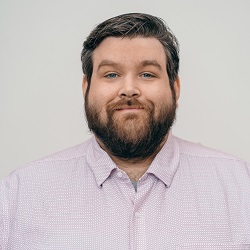Our Consultant Spotlight series is an opportunity to better meet our team at Honeydew Consulting. Tom is another one of our Beaker microbiology experts that has flexed and further strengthened his skills in his two most recent projects, enjoying the challenge of complex rule build and figuring out interesting (and appropriate) solutions. In his downtime, Tom is a gregarious culinary enthusiast passionate and avid photographer.

| Areas of expertise | Microbiology & Complex Rule (CER) Build |
| Location | Madison, WI |
| Current role | Beaker Consultant at Orlando Health focusing on microbiology and hospital care at home |
| Past organizations worked with | Mackenzie Health, Valley Children’s (Fresno), Mercy Health (Rockford), Tufts Medicine |
What’s your background?
Tom Blaich: Studied English Literature in College before heading to Epic in pursuing a Technical Writer position. But apparently I talk too much, so they pushed me towards project management/implementation. I spent about 3.5 years at Epic on the Beaker implementation team working with domestic and international customers, focusing on pathology and training improvements. I left Epic right before the pandemic (smart!) and then spent a while working with the Wisconsin Department of Health Services supporting their lab before transitioning into consulting.
Going from a technical writer to project manager must have been quite an unexpected and significant moment in your career path. What was that like? Did it take long to decide or feel like it was the right fit?
I’ve always been a very sociable person and worker so once I got into the role it definitely felt like a better fit to leverage that skillset rather than just being in my office working on deliverables. But that did also build a strong foundation to help when I needed to write those technical documents or training materials, which does come up fairly often in this job.
And then after Epic, what was the transition into consulting like for you?
Transitioning into consulting during COVID was an interesting experience, as it did mean that we were confined to our homes and it severely limited the social interactions, which coupled with a remote work schedule presented an interesting set of hurdles. But jumping back into the world of Epic after time away felt more daunting than it turned out to be. Taking time when I got back into the system to re-familiarize myself and figure out where I could make a positive impact were big. And once I started meeting with end users and being able to make an impact on the team, that confidence came back and was big.
What do you think the main differences are now compared to when you were an AC and AM?
The support structure is different. As an Epic employee, you have access to a lot of historical information and materials, and a bunch of coworkers that you can corner in their office to dig into issues and ask questions. But as a consultant, this all has to come from you. But you can still leverage that knowledge to work with your TS to grab those experts that you know and dig into issues, even if you aren’t the one with access to internal information.
What’s the best thing about your job now?
I enjoy the independence of the job, and the ability to jump into a complex situation and figure out interesting solutions. I’ve always enjoyed meeting new people and building relationships and working with lab is a treat, so getting to do that at different sites and being able to help them fix problems and get to know everyone is always enjoyable.
On your current project, you are implementing hospital care at home workflows with Beaker. I don’t think I’ve had the opportunity to see much related to that.
Hospital Care at Home presents some interesting workflow challenges specifically around collection – how do you set up a solid collection workflow with users going from a hub at a hospital to a patient’s home. Do you have phlebotomists using mobile printers and Rovers to perform collection? And if so, how do you determine which lab the specimen is sent to based on the patient’s location. We found the best workflow was to use mobile workstations/laptops coupled with mobile printers, and when phlebotomists couldn’t perform a collection, they indicate a redraw for the in home care team to tackle.
Any words of advice to others implementing?
Take the time to get to know your coworkers. Building those relationships is huge and it helps you learn who you can talk to about different issues and questions.
Finding areas to make an impact early can be big, both in helping you establish a foothold early, and in buying goodwill so that when you need more time to dig into something or you are working through a problem, your team believes you will be able to tackle the issue.
Involve lab early and involve them often. It helps build confidence in your lab SMEs that the process will go well and it will help catch problems early. I can’t say the number of Clinical Content Validation (CCV) sessions I’ve been in where due to the way in which data was obtained, there is a single issue duplicated across a large number of tests – but if you involve lab early in that first test that you build, you are able to catch these issues from the beginning and avoid having to show SMEs the same piece of broken build over and over.
Like you said, lab engagement is always huge part of any successful implementation. Any specific tips on involving the lab early? Any specific examples in your career that have really stood out in making the difference?
I’m a huge advocate for getting lab involved in build early. If they have the availability, doing build meetings with them for some of your first records gives them early exposure to the system and shows them the translation between those workbooks they filled out as a part of the discovery, and what those answers how they mean in system (I know every customer I talk to gets confused on what expiration time v. turnaround time mean when they are filling them out). And then during the process of build, bring them in to ask questions and show things off so that when you are ready to jump into CCV, they aren’t going in blind, and that rapport has already started to be built.
You mentioned to me how much you love the Madison area having moved there for Epic. What are some of your favorite things about the area?
Since I love to cook, Madison is a great city to live in. I can’t sing enough praises of the farmers market and the culture around food here and getting to try new things and meet local farmers is always a lot of fun.
I’m big into cooking, always looking to experiment with new dishes and techniques. Cooking for friends and family is something that brings me a lot of joy and is a good way for me to unwind after work – and you get a delicious meal out of it (hopefully!)
Any highlights or specific dish you’ve been really proud of recently or new techniques you’ve tried?
I grew up eating a lot of Italian food, thanks to my mom, and learned by watching her as a kid and joining her in the kitchen once I was able to. This last year, I got an ice cream machine so I could experiment with weird and dastardly concoctions, and fermentation and smoking are both a lot of fun to play around with. When working with my customer in Toronto, I stayed in Markham, which is close to a massive community of Korean restaurants, and fell in love with the cuisine, based in large part on the recommendations of the analysts I was working with.
How does that pair with any other interests?
Other than cooking, photography is also something I really enjoy, and I’ve taken the opportunity to drag my camera along on work trips over the years to see what I can get. Mostly I shoot landscapes, but food photography is also a lot of fun to me (gotta love when your hobbies align).
Beautiful!



